by Katherine Norris | Jan 23, 2020 | COBA Faculty, COBA Staff, Current Students, Outcomes, Placement stories, Student Spotlights, Uncategorized
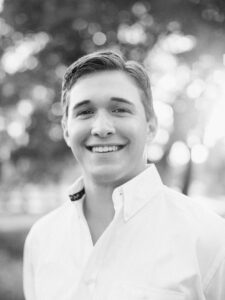
Zach Jennings
Zach Jennings is a Management major from Abilene, Texas and graduated in December 2019. Zach interned with Edward Jones this last summer. “I learned the basics of what it takes to be a financial advisor. I got to work with other offices and two other interns in town. There were about 200 interns nationwide, so having even one intern in Abilene was awesome, but we had three!”
As Zach prepared for graduation, he also prepared to begin work with Edward Jones as a financial advisor. He says, “I believe my time at ACU helped me find out what I wanted to do moving forward. Not only did it prepare me for my future career, but I grew so much in my relationship with God because of the wonderful people here.” Zach found that he wanted a career with Edward Jones after his experience as an intern and is looking forward to the great opportunities laid before him.
Zach enjoyed his college career at ACU. We asked him what his favorite thing about being a part of COBA was and how the environment influenced his growth throughout his time here. “My favorite thing about COBA was attending Leadership Summit. I grew a lot in the Lord and made so many good friendships as well. It was a refreshing and soul-quenching experience. I would say that ACU offers not only some of the best education programs out there, but what makes ACU great is the community. You actually get to know your professors and you’ll realize they want to get to know you too. The community of ACU is welcoming, inclusive and Christ-like. The people here are what sets ACU apart from the rest.”
Helping students find how their gifts and talents can be used for God in the workplace is something COBA is passionate about. For those students who aren’t sure what career path they want to take, COBA and ACU provide exploration through the COBA Edge professional development program and the guidance offered at the Career Center. To learn more about the COBA Edge program, students can email Steph Brown at srb19c@acu.edu. Students can also learn more about internships, interviewing, and career search information by reading the COBA student newsletter, looking through Handshake, or contacting Steph Brown or the ACU Career Center.
by Maddy Crockett | Dec 20, 2019 | Academics, Current Students, Faith Infusion, Student Spotlights, Student Spotlights
Senior management major, Autumn Flanders, recently completed her summer internship with a specialty coffee roaster based in Denver, Colorado. The Christian-based business’s purpose is to provide employment to young adults and teens who have been homeless and are looking to leave it behind. Flanders spent the summer in Denver aiding Purple Door in pursuing this mission.
 Autumn explained that the internship held several roles for her to play. In her responsibilities, she wrote weekly blog posts that highlighted successful social enterprises around the US, she developed a year-long social media content calendar, worked to improve content for Purple Door’s media platforms, compiled and tracked data from customers and partners, helped cater a monthly event, and sold coffee at an REI conference. “I also assisted in the coffee production process by grinding the coffee, then packaging, sealing, and labeling the coffee bags”, Autumn said.
Autumn explained that the internship held several roles for her to play. In her responsibilities, she wrote weekly blog posts that highlighted successful social enterprises around the US, she developed a year-long social media content calendar, worked to improve content for Purple Door’s media platforms, compiled and tracked data from customers and partners, helped cater a monthly event, and sold coffee at an REI conference. “I also assisted in the coffee production process by grinding the coffee, then packaging, sealing, and labeling the coffee bags”, Autumn said.
When asked what she enjoyed most about the internship, she shared that building relationships with her bosses and co-workers was huge, along with gaining first-hand knowledge of what it’s like to run a social enterprise. Autumn also appreciated engaging with customers at events and seeing regular customers while learning more about them. Connections with people were a big part of her experience.
“Interning at Purple Door Coffee provided me with an opportunity to cultivate my strengths,” Autumn explained when asked about
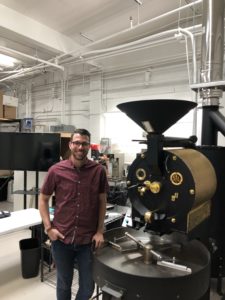
Mark Smesrud, Manager at Purple Door Roastery
how the internship will impact her future. She learned more about the types of future careers she might enjoy and what types of cities she might want to live in. “Now, when I look for future jobs, I have a better understanding of the types of work cultures and environments I prefer and the job sector that I would most enjoy working in”.
As a native to Abilene, Autumn learned a great deal from living in Colorado for the summer. When asked what grew her most, Autumn shared that being far away from home and navigating a new city were both difficult yet it pushed her to become more independent and confident in her own abilities. While at first learning new responsibilities and adjusting to the work environment of the internship was hard, looking back Autumn can see that she gained a greater understanding of the coffee industry, social enterprises, and what it is like to work with previously homeless youth and young adults.
For students looking for internships in the future, Autumn would share this advice: “[Students should] not be afraid to apply to internships in cities away from your home. I experienced a kind of growth that would’ve been more difficult to feel if I had been in my comfort zone near friends and 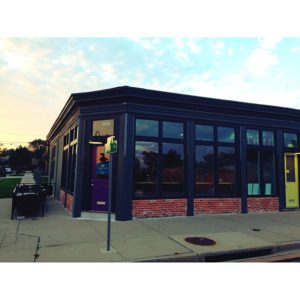 family. Living in a new state gave me a unique perspective and allowed me to experience a city with a different culture and get out of my bubble. Even though it can be scary interning in a new city, it is worth it because of the type of growth you can experience, both personally and professionally”.
family. Living in a new state gave me a unique perspective and allowed me to experience a city with a different culture and get out of my bubble. Even though it can be scary interning in a new city, it is worth it because of the type of growth you can experience, both personally and professionally”.
by Katherine Norris | Nov 19, 2019 | Academics, COBA Events, College Decisions, Current Students, Faith Infusion, Human Resource Management, Student Spotlights

Dayle Hayes
Every fall, more than 2,500 HR professionals attend the HRSouthwest Conference (HRSWC) held in Fort Worth, Texas. The conference is the largest regional educational and networking event for human resource professionals. HRSWC is organized by DallasHR, the Dallas-based SHRM (Society of Human Resource Management) Affiliate Chapter, and has been designated as the official State of Texas SHRM Conference. 15,000 student members participating in the 27 chapters of the Society for Human Resource Management (SHRM) are given the opportunity to attend this conference with working professionals. Dr. Malcolm Coco, faculty sponsor for the ACU Chapter of SHRM and Director of Internships for COBA said, “One of the highlights for students is the opportunity to be nominated for the Excellence in Education Scholarship. As you can imagine, the scholarship is very competitive with each chapter being able to nominate candidates for the award.”
Dayle Hayes, senior marketing and human resource management major and President of SHRM, is one of four recipients of the HR Excellence in Education Scholarship given this past October. Winners of the scholarship have shown excellence in academic pursuits as well as their professional and personal lives. The award selections were based on accomplishments in human resources, academics, campus and community involvement and recommendations from professors, advisors and/or employers. The scholarship recipients each receive a $1,500 grant plus shared proceeds from The HRSouthwest Conference Silent Auction.
Dayle says, “I am very excited and thankful to be awarded this scholarship. As Dr. Coco’s TA, I have been able to benefit from his leadership as the sponsor of SHRM’s student chapter on campus as well as attending some of the Big Country SHRM monthly meetings with him, where he sits on the board of directors.”
Dr. Coco felt that Dayle was a worthy candidate and nominated her because, “of her dedication and professionalism as the student chapter president and as a member of the local professional chapter Executive Board. Dayle has demonstrated leadership and high academic accomplishments. She deserved the nomination and being selected as the recipient of this scholarship.”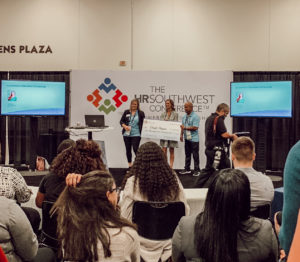
Dayle was thankful for the opportunity to gather with professionals in the field. “The conference was great, and I really enjoyed being able to attend for the second time. I went to several speaker sessions and heard about prevalent HR-related topics. There were thousands of HR professionals there, so I also got to network and meet several people in the field. I ran into one of my childhood friends who is a recent graduate and has been working in HR for a couple years now, which was really fun.”
Congratulations to Dayle Hayes on this outstanding honor. Click here to learn more about the HRSouthwest Conference. Learn more about the Big Country SHRM chapter by clicking here.
by Hanna Roberts | Oct 1, 2018 | Academics, Current Students, Management, Student Spotlights, Student Spotlights

Trent Warren at Schriever Air Force Base.
Trent Warren is a senior business management major from Colorado Springs, Colorado. This summer, Trent was an intern for Lockheed Martin, a global security and aerospace company. Trent worked as a systems engineer in the Experimentation Lab (X-Lab) at the Missile Defense Agency (MDA). Specifically, Trent worked in control account management, space system engineering, and also participated in the Lockheed Martin summer intern project.
Trent was able to grow professionally this summer because of the variety of projects he worked on and what he learned from his coworkers. He gained experience in finance, programming, and engineering because he was not limited to one type of project. He also knows that working with the brilliant people in the X-lab was key to his growth this summer. Throughout his internship, they guided Trent and challenged him to accomplish difficult but rewarding tasks.
Trent’s favorite part of his internship was working in the X-Lab. He got to work on and solve new and exciting problems. Even though he was there for a short time, Trent feels as if the work he did helped those around him and, more importantly, fulfilled the mission and values of the MDA. Trent’s experience will help launch him into a promising career in systems engineering. He discovered a lot about what it means to be an engineer and how to overcome obstacles in the job. Trent plans to take the lessons he learned this summer with him for the rest of his life.
Reflecting on his internship, Trent has three pieces of advice for future interns:
1. Push through your blockers. Whenever you get stuck on something, or whenever a task just seems too difficult to accomplish, keep attacking it from every conceivable angle. There are plenty of people that can do most of the work on a job. What makes you stand out is if you can use your resources to finish a job that no one else can figure out.
2. Write. Down. Everything. Every business has their acronyms and lingo. If you do not understand what something means in a meeting or in a conversation, write it down and ask someone later. Knowledge is power, and the first step to knowledge is writing down what you don’t know (which is usually almost everything at first).
3. Work hard for the right reason. In every business, there are people who are just working for the next promotion. Personally, I work for the people around me, for the mission of the organization, and for my God. Pick what you work for because that philosophy affects every decision you make.
by Hanna Roberts | Jul 23, 2018 | Current Students, Faith Infusion, Student Spotlights, Student Spotlights
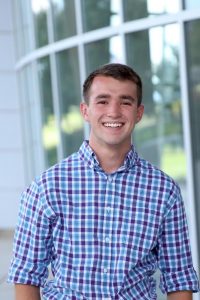
Zach Fetter (’19)
Zach Fetter is a senior with majors in finance and youth ministry from Charlotte, North Carolina. This summer, Zach is an operations intern at Hill Country Bible Church in Austin. As the fiscal year starts on September 1st, leaders across the church have been building budgets for their respective ministries. Zach has met with more than fifty leaders to work through and approve their budgets in preparation for the new fiscal year. He is helping build a projection for the church’s giving numbers for the next year and will present those to the executive pastors and elders. Zach is also in charge of implementing new goal software for the staff that will lead to the improved alignment of the church’s goals from top to bottom.
Through these projects, Zach has been able to learn a lot about how the church operates and its responsibility to be faithful stewards of the money that congregants give for ministry. He has also made strong connections with those around him. Zach’s favorite part of his internship so far has been meeting with the leaders for budget reviews. “Sitting down and talking one-on-one with each leader has given me so much experience in learning how the church stewards money,” says Zach “I hope that this knowledge will help me to confidently and strategically lead a church towards fiscal responsibility one day.”
Zach has also had the opportunity to receive feedback in a job that has helped guide how he approaches his day-to-day. Every week, Zach has a one-on-one with his boss, one of the church’s executive pastors. These one-on-one meetings have grown him the most this summer, both spiritually and professionally. In those meetings, Zach is commended for what he has done well but is also guided through areas in which he can improve. Zach has taken the advice very seriously and applies it to his job and life, as he knows this feedback will help him become a better leader of a church someday.
One thing that has struck Zach in his time at Hill Country Bible Church is the wholehearted submission to God that is evident in every staff member and in the church overall. “The one thing that has been crucial to everything I have done in my internship has been a reliance on God,” says Zach. “The way that the leadership of the church relies on faith and prayer is evident.” Zach has learned that the church could not conduct their business as effectively as they do if they did not consistently give up control and wait to see what God will do through their organization. This is a principle that he believes goes beyond Hill Country Bible Church and his internship and is something that he will remember and apply when he returns to Abilene and for the rest of his life.
by Hanna Roberts | Jul 17, 2018 | Academics, Careers In..., Current Students, Student Spotlights, Uncategorized
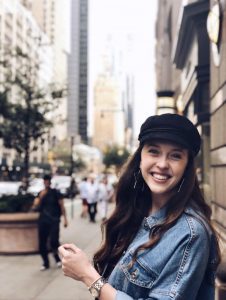 Ever since she was a little girl, Sloan Polvado has had an obsession with fashion – specifically, shoes. Sloan has always wanted to work in the fashion industry and this summer has had the opportunity to fulfill that dream.
Ever since she was a little girl, Sloan Polvado has had an obsession with fashion – specifically, shoes. Sloan has always wanted to work in the fashion industry and this summer has had the opportunity to fulfill that dream.
Sloan, a junior marketing major from Sugar Land, is interning with Steve Madden in New York City in the production department. She aids in preparing the production schedules, helping set up timetables that allocate Steve Madden resources to manufacture and sell their shoes. Sometimes, Sloan will get to try on the new designs and give the design team feedback on them and recommendations for adjustments.
Sloan has loved getting to learn more about the fashion industry. “It has been awesome to see all of the work that goes into creating a shoe – the different materials and styles as well as the numbers and math – and taking it from design to a store,” says Sloan.
The Steve Madden internship program itself has also taught Sloan a lot. “Knowing that I will be contending with talented and driven people like the other interns in this program for a job after graduation has taught me that I have to do everything I can to make myself as competitive as possible,” she noted. Of the thirty summer interns, Sloan is the only one from the south and has found it interesting to compare ACU and her college experience with the other interns. The program has helped Sloan realize how competitive it can be in the professional world and the work that goes into distinguishing yourself when looking for internships and jobs. Outside of gaining practical experience, she has loved connecting with the people around her. She has also had the opportunity to meet Steve Madden himself, who loves getting to know and interacting with his interns. “Steve is a really fun and approachable guy,” according to Sloan. “He will always look at your shoes before making eye contact with you.”
She is excited to return to Abilene with new knowledge and a new motivation to prepare for a job after graduation. “I have learned so much valuable information about the fashion industry, what it is like to work in a major company, and networking connections with those around her – oh, and the free shoes aren’t too bad either.”

 Autumn explained that the internship held several roles for her to play. In her responsibilities, she wrote weekly blog posts that highlighted successful social enterprises around the US, she developed a year-long social media content calendar, worked to improve content for Purple Door’s media platforms, compiled and tracked data from customers and partners, helped cater a monthly event, and sold coffee at an REI conference. “I also assisted in the coffee production process by grinding the coffee, then packaging, sealing, and labeling the coffee bags”, Autumn said.
Autumn explained that the internship held several roles for her to play. In her responsibilities, she wrote weekly blog posts that highlighted successful social enterprises around the US, she developed a year-long social media content calendar, worked to improve content for Purple Door’s media platforms, compiled and tracked data from customers and partners, helped cater a monthly event, and sold coffee at an REI conference. “I also assisted in the coffee production process by grinding the coffee, then packaging, sealing, and labeling the coffee bags”, Autumn said.
 family. Living in a new state gave me a unique perspective and allowed me to experience a city with a different culture and get out of my bubble. Even though it can be scary interning in a new city, it is worth it because of the type of growth you can experience, both personally and professionally”.
family. Living in a new state gave me a unique perspective and allowed me to experience a city with a different culture and get out of my bubble. Even though it can be scary interning in a new city, it is worth it because of the type of growth you can experience, both personally and professionally”.



 Ever since she was a little girl, Sloan Polvado has had an obsession with fashion – specifically, shoes. Sloan has always wanted to work in the fashion industry and this summer has had the opportunity to fulfill that dream.
Ever since she was a little girl, Sloan Polvado has had an obsession with fashion – specifically, shoes. Sloan has always wanted to work in the fashion industry and this summer has had the opportunity to fulfill that dream.